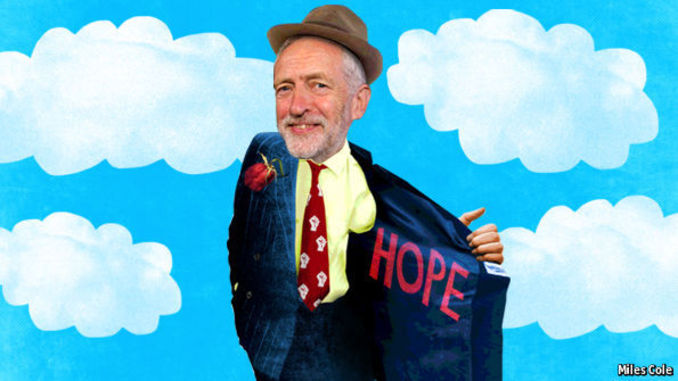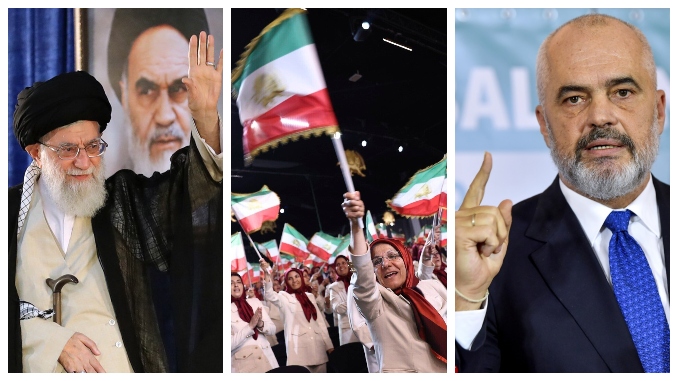The Economist compares Labour’s Corbyn to Albania’s 1997 Pyramid Scheme Boss

The Economist compares Labour’s Corbyn to Albania’s 1997 Pyramid Scheme Boss. Bagehot says that Jeremy Corbyn is light on substance and heavy on salesmanship, while Corbynism is a political pyramid scheme.
Bagehot
Jeremy Corbyn, dodgy dealer
ALL big suits and swagger, Vehbi Alimucaj was a symbol of Albania’s post-Soviet embrace of capitalism. The fall of communism had blown open the economy, people had money to invest and Mr Alimucaj—a businessman known as “the Pharaoh”—knew, or claimed to know, where to put it to work. Savers piled in, attracted by interest rates that looked too good to be true. They were: Mr Alimucaj was a fraudster and used the deposits of each new wave of investors to pay the dividends promised to previous waves. When his pyramid scheme and others like it brought down the Albanian economy in 1997 he was arrested and found guilty of stealing $325m from his fellow citizens. How had he done it? Albania’s then-unsophisticated financial culture had played a role. But so too had an eternal truth: it can be remarkably easy to sell an imaginary product if it sounds good enough.
Bagehot recalled this tale as he watched Jeremy Corbyn’s big speech at the Labour Party conference on September 28th. Thousands of idealistic lefties had flooded into Labour to re-elect him as party leader. But why? Starchy and monotone, Mr Corbyn’s public speaking has improved in recent months, but only from terrible to mediocre. And for a man who had spent the past few days swanning about the conference telling everyone he was putting Labour on an election footing, he had a flimsy prospectus.
On Brexit, Britain’s most pressing priority, he had nothing substantive to say. Likewise on the budget deficit, the root cause of Labour’s electoral defeat only last year. In his speech he wafted about a long shopping list—more research spending, infrastructure investment and cash for areas with high immigration rates—without saying where he would find the dosh. His wishlist of ten policies including “action to secure our environment” and “security of work” read as if he were the first person to think of the notions. The man proposing himself as Britain’s next prime minister offered only, to quote Kerry McCarthy, a former shadow cabinet minister, “things you could fit on a T-shirt”.
Mr Corbyn was equally unconvincing about how he might one day reach Downing Street. Though his triumphant re-election subdued the party’s deep rifts during the conference, they remain live. From the podium Len McCluskey, the loyalist boss of Labour’s largest affiliated union, called for Mr Corbyn’s enemies to quit. Meanwhile Mr Corbyn himself betrayed next to no real curiosity in the electorate. He had nothing to say about the causes of Labour’s defeat last year, or why the party is on its lowest poll score in opposition for three decades. Nor was he any more willing to engage with a mass media he has, to date, treated as a walking insult. Instead of conducting the usual breakfast interview with the BBC on the morning of his speech, he recorded one in advance, his aides reportedly explaining that the would-be prime minister “is not a morning person”.
Yet this potpourri of unfunded policies, nice words and electoral complacency has attracted legions to his party. Its membership has more than doubled since Mr Corbyn became leader; 15,500 joined after his re-election on September 24th. His rallies over the summer typically attracted thousands. This energy was palpable at The World Transformed, an alternative conference hosted by Momentum (Mr Corbyn’s unofficial cheerleading brigade) a short walk from Labour’s official gathering. In a cavernous former church stallholders representing anti-poverty and anti-racism campaigns vied with Corbynista platform speakers. One stand offered copies of the “Corbyn Colouring Book” and even a collection of poems praising the man: “Gee, Jeremy Corbyn, we’re sorry to say / That compromise and stalling have led us astray.” To thunderous applause Mr Corbyn told the conference: “Our hugely increased membership is part of a movement that can take Labour’s message into every community.”
Like Mr Alimucaj he has made a virtue of having little of substance to offer those investing in him. He makes up for his lack of details about how he will win power in a sceptical country and realise socialism in a competitive world by hailing the almost mystical capacities of his movement. In Liverpool its growth was widely heralded as proof that ordinary Britons can be won over. In his punchy speech on September 27th Tom Watson, Mr Corbyn’s moderate deputy, praised the new mayor of London, Sadiq Khan, for winning elections. “Just like Jeremy Corbyn does,” heckled an old duffer in the crowd, revealingly eliding the Labour leader’s appeal to the half-million Britons involved in the party with the 45m-strong electorate at large.
Mr Corbyn’s genius is that all this is self-reinforcing. The more vague and sweeping the promises and ideals he ascribes to the movement, the more people join it. The more who do so, the more formidable the movement seems. Labour’s leader is using the deposits of hope placed by one group to pay the dividends expected by the previous one. Overall the process gives the impression of success and motion that far outstrips any basic asset, including any kind of plan to win power and wield it effectively.
The movement, c’est moi
All pyramid schemes collapse eventually. It is not clear when that will happen to Corbynism. Most commentators and Labour moderates expect him to lose the next general election, probably badly. But there is no guarantee that this will end the cycle; that it will not just be seen as proof the movement is not yet big enough to take on interests—media, business, defence—that have supposedly conspired against Mr Corbyn. This vicious circle helps explain why Labour’s reality-based politicians, including Mr Watson and Mr Khan, seem stuck in a cul-de-sac. None wants to split Labour: the party is too tribal for that and most doubt a new moderate party could survive under Britain’s majoritarian electoral system. Yet recruiting enough centre-left types to take on Mr Corbyn’s uncannily pyramidical movement looks like a long shot. There are no good options.
From the print edition: Britain






